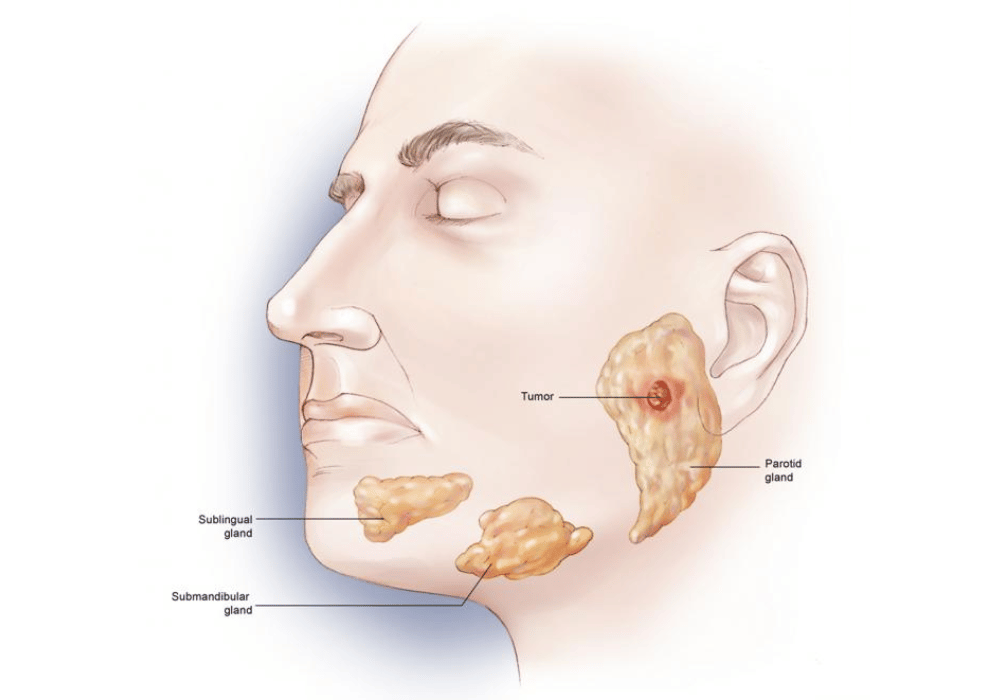Salivary Gland Malignancy

Salivary Gland Malignancy Services at Team Reconface
Team Reconface is dedicated to providing specialized care for individuals diagnosed with salivary gland malignancies. Our experienced oral and maxillofacial surgeons, in collaboration with oncologists and other specialists, offer comprehensive and personalized treatment plans to address malignancies, ensuring the best possible outcomes for our patients.
Common Salivary Gland Malignancies:
Mucoepidermoid Carcinoma:
- Mucoepidermoid carcinoma is a common malignant tumor that can occur in major and minor salivary glands. Treatment may involve surgical removal, radiation therapy, and, in some cases, chemotherapy.
Adenoid Cystic Carcinoma:
- Adenoid cystic carcinoma is a slow-growing but aggressive malignancy often found in the salivary glands. Treatment may include surgery, radiation therapy, and, in some cases, targeted therapy.
Acinic Cell Carcinoma:
- Acinic cell carcinoma is a rare but usually low-grade malignancy that can affect the salivary glands. Treatment involves surgical removal, and in some cases, additional therapies may be recommended.
Mucoadnoid Carcinoma:
- Mucoadnoid carcinoma is a rare subtype of adenocarcinoma that may occur in the salivary glands. Treatment approaches may include surgery and radiation therapy.
Salivary Duct Carcinoma:
- Salivary duct carcinoma is an aggressive malignancy that often presents in the parotid gland. Treatment involves surgery, radiation therapy, and, in some cases, systemic therapies.
The Treatment Process for Salivary Gland Malignancies:
Diagnosis and Staging:
- Accurate diagnosis and staging are essential for determining the extent of the malignancy. This may involve imaging studies, biopsy, and other diagnostic tests.
Multidisciplinary Consultation:
- A multidisciplinary team, including oral and maxillofacial surgeons, oncologists, and other specialists, collaborates to develop a comprehensive treatment plan.
Surgical Intervention:
- Surgical removal of the malignancy is often a primary treatment. The type of surgery depends on factors such as tumor size, location, and histology.
Radiation Therapy:
- Radiation therapy may be recommended before or after surgery to target remaining cancer cells and reduce the risk of recurrence.
Chemotherapy and Targeted Therapies:
- In some cases, chemotherapy or targeted therapies may be recommended, especially for aggressive or recurrent malignancies.
Reconstruction and Rehabilitation:
- Reconstruction of affected areas may be performed to restore function and appearance. Rehabilitation services may be provided to address any functional deficits.
Follow-Up and Surveillance:
- Regular follow-up appointments are scheduled to monitor recovery, assess for any signs of recurrence, and provide ongoing support.
Why Choose Team Reconface for Salivary Gland Malignancies?
Multidisciplinary Team: Our team collaborates with oncologists, radiologists, and pathologists to ensure a comprehensive and accurate approach to the diagnosis and treatment of salivary gland malignancies.
Advanced Treatment Options: We incorporate the latest advancements in surgical techniques, radiation therapy, and targeted therapies to provide the most effective and individualized treatment for each patient.
Patient-Centered Care: We prioritize patient education, communication, and involvement in decision-making throughout the treatment process. Our goal is to support and guide patients and their families through every step of their journey.
The prognosis varies depending on the type, stage, and aggressiveness of the malignancy. Early detection and a comprehensive treatment approach improve the chances of successful outcomes.
The type of surgery is determined based on factors such as the location and size of the tumor, as well as the involvement of surrounding structures. The goal is to achieve complete tumor removal.
The need for radiation therapy depends on factors such as the type and stage of the malignancy. It may be used to target residual cancer cells after surgery or as a primary treatment in some cases.
Side effects vary based on the type of treatment and may include fatigue, changes in saliva production, and temporary or permanent changes in facial appearance. The multidisciplinary team works to minimize side effects and provide supportive care.
While the risk of recurrence varies, regular follow-up appointments are crucial to monitor for any signs of recurrence and provide timely intervention if needed.
Meet Our Surgeons
Opening Hours
Mon – Fri
08.00 -18.00
Sat – Sun
09.00 -15.00
Make Your Appointment

MDS, Oral & Maxillofacial Surgery Travel Fellowship (AOCMF, Germany)
Special Interest in: Oral Cancer, Orthognathic Surgery & Facial Deformity Correction

MDS, Oral & Maxillofacial Surgery Travel Fellowship, AOCMF(Beijing) Fellowship (AIMS, Kochi)
Special Interest In: Facial Reconstruction, Oral Cancer, Facial Trauma & Orthognathic Surgery

MDS, Oral & Maxillofacial Surgery
Special Interest In: Facial Reconstruction, Oral Cancer, Facial Trauma & Orthognathic Surgery
